Related Research Articles

Jack McDevitt is an American science fiction author whose novels frequently deal with attempts to make contact with alien races, and with archaeology or xenoarchaeology. Most of his books follow either superluminal pilot Priscilla "Hutch" Hutchins or galactic relic hunters Alex Benedict and Chase Kolpath. McDevitt has received numerous nominations for Hugo, Nebula, and John W. Campbell awards. Seeker won the 2006 Nebula Award for Best Novel.

Michael Swanwick is an American fantasy and science fiction author who began publishing in the early 1980s.

Ted Chiang is an American science fiction writer. His work has won four Nebula awards, four Hugo awards, the John W. Campbell Award for Best New Writer, and six Locus awards. His short story "Story of Your Life" was the basis of the film Arrival (2016). He was an artist in residence at the University of Notre Dame in 2020–2021.
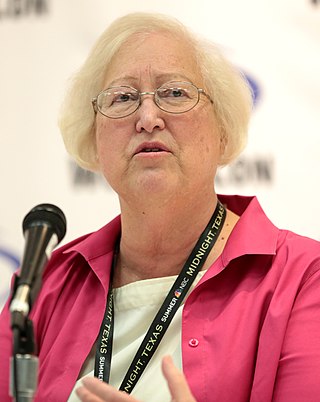
Constance Elaine Trimmer Willis, commonly known as Connie Willis, is an American science fiction and fantasy writer. She has won eleven Hugo Awards and seven Nebula Awards for particular works—more major SF awards than any other writer—most recently the "Best Novel" Hugo and Nebula Awards for Blackout/All Clear (2010). She was inducted by the Science Fiction Hall of Fame in 2009 and the Science Fiction Writers of America named her its 28th SFWA Grand Master in 2011.

John Joseph Vincent Kessel is an American author of science fiction and fantasy. He is a prolific short story writer, and the author of four solo novels, Good News From Outer Space (1989), Corrupting Dr. Nice (1997), The Moon and the Other (2017), and Pride and Prometheus (2018), and one novel, Freedom Beach (1985) in collaboration with his friend James Patrick Kelly. Kessel is married to author Therese Anne Fowler.

Kate Wilhelm was an American author. She wrote novels and stories in the science fiction, mystery, and suspense genres, including the Hugo Award–winning Where Late the Sweet Birds Sang. Wilhelm established the Clarion Workshop along with her husband Damon Knight and writer Robin Scott Wilson.
Michael Lawson Bishop is an American writer. Over four decades and in more than thirty books, he has created what has been called a "body of work that stands among the most admired and influential in modern science fiction and fantasy literature."

Kelly Link is an American editor and author of short stories. While some of her fiction falls more clearly within genre categories, many of her stories might be described as slipstream or magic realism: a combination of science fiction, fantasy, horror, mystery, and realism. Among other honors, she has won a Hugo award, three Nebula awards, and a World Fantasy Award for her fiction, and she was one of the recipients of the 2018 MacArthur "Genius" Grant.
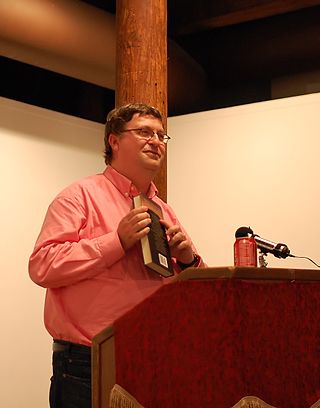
Andy Duncan is an American science fiction and fantasy writer whose work frequently deals with Southern U.S. themes.
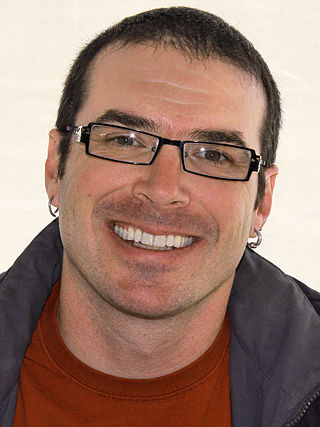
Paolo Tadini Bacigalupi is an American science fiction and fantasy writer. He has won the Hugo, Nebula, John W. Campbell, Compton Crook, Theodore Sturgeon, and Michael L. Printz awards, and has been nominated for the National Book Award. His fiction has appeared in The Magazine of Fantasy & Science Fiction, Asimov's Science Fiction, and the environmental journal High Country News. Nonfiction essays of his have appeared in Salon.com and High Country News, and have been syndicated in newspapers, including the Idaho Statesman, the Albuquerque Journal, and the Salt Lake Tribune.

Terry Carr's Best Science Fiction of the Year is an anthology of science fiction short stories edited by Terry Carr, the fourteenth volume in a series of sixteen. It was first published in paperback by Tor Books in July 1985, and in hardcover and trade paperback by Gollancz in October of the same year, under the alternate title Best SF of the Year #14.
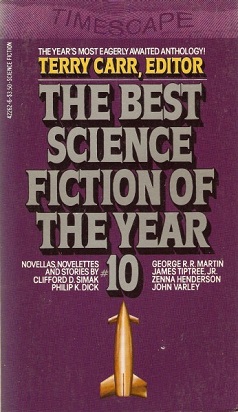
The Best Science Fiction of the Year #10 is an anthology of science fiction short stories edited by Terry Carr, the tenth volume in a series of sixteen. It was first published in paperback by Pocket Books in July 1981, and in trade paperback and hardcover and trade paperback by Gollancz in the same year.

The Best Science Fiction of the Year #11 is an anthology of science fiction short stories edited by Terry Carr, the eleventh volume in a series of sixteen. It was first published in paperback by Pocket Books in July 1982, and in hardcover by Gollancz in the same year.
Rachel Swirsky is an American literary, speculative fiction and fantasy writer, poet, and editor living in Oregon. She was the founding editor of the PodCastle podcast and served as editor from 2008 to 2010. She served as vice president of the Science Fiction and Fantasy Writers of America in 2013.
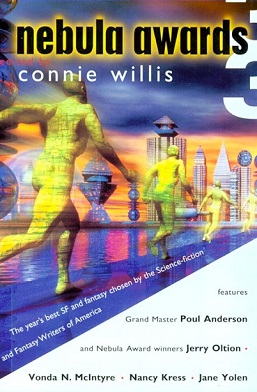
Nebula Awards 33 is an anthology of science fiction short works edited by Connie Willis. It was first published in hardcover and trade paperback by Harcourt Brace in April 1999.
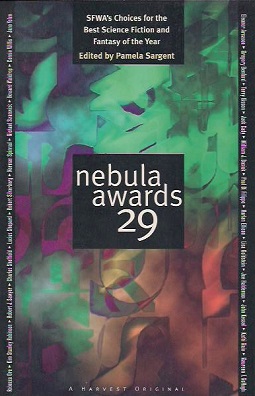
Nebula Awards 29 is an anthology of award-winning science fiction short works edited by Pamela Sargent, the first of three successive volumes under her editorship. It was first published in hardcover and trade paperback by Harcourt Brace in April 1995.

Nebula Awards 27 is an anthology of science fiction short works edited by James Morrow, the second of three successive volumes under his editorship. It was first published in hardcover and trade paperback by Harcourt Brace in April 1993.

Nebula Award Stories Sixteen is an anthology of award winning science fiction short works edited by Jerry Pournelle and John F. Carr. It was first published in hardcover by Holt, Rinehart and Winston in August 1982; a paperback edition was issued by Bantam Books in September 1983. British editions were issued by W. H. Allen (hardcover) and Star (paperback) in 1983; the latter under the variant title Nebula Winners Sixteen.

Nebula Awards Showcase 2004 is an anthology of award-winning science fiction short works edited by Vonda N. McIntyre. It was first published in trade paperback by Roc/New American Library in March 2004.

Brooke Bolander is an American author of speculative fiction.
References
- ↑ The Locus Index to the Hugo Awards: 2002 Archived 2008-01-12 at the Wayback Machine
- ↑ The Locus Index to the Nebula Awards: 2003 Archived 2004-02-17 at the Wayback Machine
- ↑ Flogging Babel: The Compleat (To Date) Darger & Surplus (Michael Swanwick's blog)
- ↑ "The Little Cat Laughed to See Such Sport"